How to Remove Virus and Spyware
 Removing virus’ can be about as fun as pulling splinters. Sounds exciting doesn’t it? That is why preventing from getting a virus is always the best method. So if your here and you have a virus, first we recommend that you head over to Grisoft and purchase AVG Internet Security (Can be installed on 3 computers in your home) and begin a full system scan to rid your system of any nasties that are lurking. The same goes for if you are having annoying pop ups or any other form of spyware and adware go over to Malwarebytes.org and purchase Malwarebytes Anti-Malware. Then come back here and find out how to keep these pests from coming back and stay on the defensive.
Removing virus’ can be about as fun as pulling splinters. Sounds exciting doesn’t it? That is why preventing from getting a virus is always the best method. So if your here and you have a virus, first we recommend that you head over to Grisoft and purchase AVG Internet Security (Can be installed on 3 computers in your home) and begin a full system scan to rid your system of any nasties that are lurking. The same goes for if you are having annoying pop ups or any other form of spyware and adware go over to Malwarebytes.org and purchase Malwarebytes Anti-Malware. Then come back here and find out how to keep these pests from coming back and stay on the defensive.
How Do Virus and Spyware Get In?
• No Anti-Virus or Anti-Adware installed or database is out of date
• Untrusted websites (often third party, pornographic, selling illegal software, fly-by-night products.)
• E-Mails: Attachments, links, photos, files.
• Instant Messengers, Peer-to-Peer Software (not the software, but the person your downloading from)
• Infected external media like a floppy, flash drive, CD, hard drive, etc.
• Pop up or pop under ads that say the your system is infected and needs to be cleaned.
• Video that request to install an ActiveX plug-in that you are not familiar with.
AVG Internet Security Options:
• 2 Year (3) Computer Internet Security
• 2 Year (5) Computers Internet Security
• 2 Year Network Edition for Businesses (10 Computers)
• 2 Year Network Edition for Businesses (100 Computers)
Prevention: “The best preventions is user intervention” – Ryan Hutzel, RCCS
Virus and Spyware prevention is often best combated by the user. While not nearly all of it can be fought off by the user here are the basic things to do to prevent virus’ and spyware from getting on your computer.
• If you get an email from a “friend” that says they want you to check something out, click on a link, or open an attached file, think twice before you do. Check and see if they first address your name in the salutation and if they signed off personally. If it seems strange and they send it to many others (forwarded) with the content of the body seeming personal, it may be worth an e-mail back to them to see if they sent it to begin with. E-mail virus’ work this way. They get into an address book and send out a general e-mail to everybody. Then only to continue to spread if your system gets infected reproducing the process on your computer.
• Stay away from websites that want you to install programs that you are not familiar with. If you install an ActiveX program on your computer, then you have given full permission for the spyware/virus to be there. This is most common among the “you computer is infected” ads that pop up on annoying good for just about nothing websites.
• Instant messengers: never accept any pictures or files from somebody you don’t know.
• Peer-2-Peer (like Edonkey, Limewire, BearShare, etc.) are up and coming with many legal uses, however you are still directly downloading from another computer out there that may be a stand alone personal computer without a working anti-virus. Be cautious when using these client softwares.
• When you see a pop up that says “Your computer is infected” or “Your computer may be infected” just click the “X” in the upper right corner. Never press cancel or okay. The buttons can be programmed to do other things than cancel or go away. If there is no “x”, then alt-control-delete, and end task the window.
• Never, never, never!!!! let your anti-virus subscription or anti-adware/spyware subscription run out or database be out of date. It only takes a second to get a virus, and possibly many hours or dollars to rid them.
What harm can Virus’ or Spyware Do?
• Steal your personal data (Identity Theft)
• Corrupt your operating system to an unusable state
• Nag you to buy software to remove itself
• Allow your computer to be accessed by another with no restrictions.
• Some virus’ can cause physical harm to a computer such as over heating, and electronic failures.
• Most importantly they ultimately hurt your wallet and hard earned dollars.
Why do People Create Virus’ and Spyware?
• Nothing better to do with their talents than be destructive.
• To infiltrate secure infrastructures like databases, government, and personal computers. Sort of a challenge high.
• Spy vs. Spy: There are virus wars among virus creators. Neither side is good, but against on another. Getting Even!
• Black hat way of selling products.




 Removing virus’ can be about as fun as pulling splinters. Sounds exciting doesn’t it? That is why preventing from getting a virus is always the best method. So if your here and you have a virus, first we recommend that you head over to Grisoft and purchase
Removing virus’ can be about as fun as pulling splinters. Sounds exciting doesn’t it? That is why preventing from getting a virus is always the best method. So if your here and you have a virus, first we recommend that you head over to Grisoft and purchase  Before considering any recommendations below, please remember if you have data on your laptop that is important to you, then you should have a backup copy of that data before attempting to any repair work. RCCS will not be responsible for any damages or lost of data with any suggestion or recommendation below. End-User assumes all risk.
Before considering any recommendations below, please remember if you have data on your laptop that is important to you, then you should have a backup copy of that data before attempting to any repair work. RCCS will not be responsible for any damages or lost of data with any suggestion or recommendation below. End-User assumes all risk.
